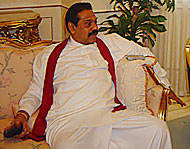RIYADH, 29 May 2007 — “Saudi Arabia means a lot to Sri Lanka whose people cherish the friendship with the Kingdom with reverence and affection,” Sri Lankan President Mahinda Rajapakse said in an interview with Arab News during a brief stopover in Kuwait. Rajapakse visited the emirate after attending the G-11 World Economic Summit held in Jordan. Rajapakse said Saudi Arabia is home to 550,000 Sri Lankan workers.
The Kingdom, he said, had always supported Sri Lanka. In addition to a housing complex named after King Abdullah, the Saudi government had funded the construction of bridges, roads, hospitals and other infrastructure facilities helping the development of the island nation.
The president disclosed that Sri Lanka had already submitted its application seeking observer status in the Organization of the Islamic Conference (OIC).
Rajapakse has been the president of the Sri Lankan Committee for Solidarity with Palestine for the past 25 years and has always called for a peaceful settlement of the Middle East problem within the framework of a sovereign Palestinian state. “Sri Lanka has identical views with the Kingdom on all international issues and we welcome the relaunching of the Arab peace initiative.”
Speaking about the ethnic conflict in his country, Rajapakse said Sri Lanka has suffered heavily from terrorism. “We have been working together with the global community to deal with terrorism.
“We have confronted senseless terrorist violence while remaining fully committed to safeguarding human rights and democracy. Political negotiations and constitutional reforms have been initiated to address the concerns of all communities.”
He said the island had lost some of its great leaders like former President Ranasinghe Premadasa, former Foreign Minister Lakshman Kadirgamar and even prominent Tamil political leaders to terror.
“We have lost around 65,000 innocent people due to the atrocities of the LTTE (Liberation Tigers of Tamil Eelam) rebels (fighting for a separate homeland for the Tamils living in the north and east of the island). Some 90,000 Muslims who were living in the north were chased out from their homes and they are now living as refugees in other parts of the country.” Tamil rebels killed some Muslims while they were praying inside mosques.
“We successfully thwarted LTTE’s plans to carry out a systematic ethnic cleansing of Muslims in some parts of the island,” he said, recalling that Muslims who were chased out from Mutur by the Tamil rebels were promptly rehabilitated in their own areas due to the timely action of the government.
Muslims form seven percent of the island’s population.
Rajapakse said the government has been trying to come to a negotiated settlement with the Tamils for the past three decades. “There is no justification for the LTTE activities since all communities in the island — Muslims, Tamils and the Sinhalese Buddhist majority — live in harmony.”
He pointed out that 54 percent of the Tamils who are living outside the north and east of the island are living in amity with the other communities. “The LTTE’s writ runs only in two of the country’s 25 districts.”
Rajapakse dismissed the LTTE allegations that minorities are discriminated against by his government.
Although confronted by many challenges, he said that Sri Lanka sustained an economic growth in excess of 7.2 percent during 2006 against a growth of 6.2 percent in 2005. Unemployment dropped to 6 percent. Exports grew by around 8 percent. “We have attracted overseas remittances of over $2 billion. We managed to attract foreign investment in excess of $600 million.”
In a message to the one million Sri Lankan expatriates in the Middle East, the president said that he deeply appreciates their contributions to the national coffers. In recognition of their services, the government had created a separate ministry to look after the welfare of the overseas Lankan workers.
Rajapakse said that the Lankan migrant workers are welcome to make suggestions as to how the government could play a more effective role in their welfare.
Recently, on president’s instructions, Sri Lanka’s overseas missions designated one day in a week as “Public Day” to enable the community members to meet the embassy officials without prior appointment.


